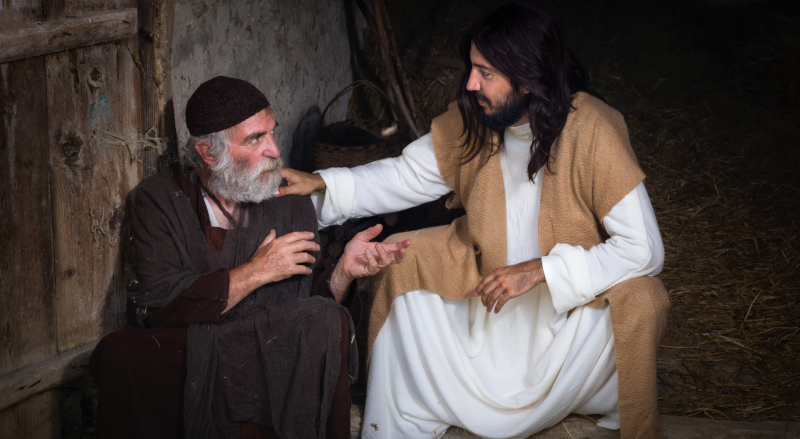False Bread, Part 1
We live in a realm where people are often mistreated by institutions. And that’s really the story of the man who was born blind (John 9:1-12).
We prayed at the beginning of the service, “Gracious Father, whose blessed Son, Jesus Christ, came down from heaven to be the true bread that gives life to the world. Give us this bread, we pray.”
False Bread in Tradition
There is such a thing as false bread.
It can come via religious institutions that care more about keeping rules and keeping up appearances than actually having a relationship with this one, Jesus Christ, who is so full of life and love and vitality, who cares for everyone equally regardless of their status. And this is certainly shown in today’s passage.
If Jesus had only been interested in hanging out with the influential to try to make a difference in the institution, he would not have hung out with this man. When they meet him, the disciples ask a provocative but important question, “Rabbi, who sinned? This man or his parents that he was born blind? (John 9:2).
The folk-knowledge of this era was that if you were born with some kind of congenital birth defect, that was obviously because of a curse pattern operating in your family. Because the parents had done evil things, judgment was visited on the children.
I know it’s ridiculous. But that’s what they believed. And it wasn’t new. Way back at the time of Jeremiah the prophet, several hundred years earlier, Jeremiah, trying to correct the same thinking, says, “I know it is said (and this is their parabolic language), ‘The parents have eaten sour grapes, and the children’s teeth are set on edge” (Jer. 31:29), adding “But [now] all shall die for their own sins.”
A very provocative thing for Jeremiah to have said in his era. We’re still wrestling, even to this day, with the relationship between corporate and individual responsibility. But in this case, the one who bore the brunt of these false judgments and superstitious folklore was this man born blind, whom people assumed to have been cursed by God for what had happened in the life of his family.
And Jesus says, “You’re asking the wrong question.” And he goes to the man, and he does something any Jew watching would have understood. He took dirt, put a little spittle in it to create, in essence, mud, and put it on the man’s eyes. What would echo in the head of the Jews was Genesis, where the Lord forms man out of the dust of the ground.
In other words, what we’re seeing are the actions of Jesus as Creator God incarnate, again, through the medium of dust, through which comes his great power, that in fact changes the congenital birth defect, so that the man can visibly see, in a way that shocks everyone.
It’s true. There’s no record in the Old Testament of anyone being supernaturally healed of blindness from birth. No wonder when people would run into him and say, “Isn’t that the beggar who was born blind?” they’d have to say, “No, it just looks like him,” because they’d never seen anything like that before. It was a small town, they knew each other, and they knew who his parents were. But this did not fit what they had known in the past. What they had known was false bread.
False Bread in the Church
I have extraordinary sympathy with this story because I meet people all the time who have an interest in Jesus but have not been treated well by the church. It resonates with me, because in some ways, that’s my story. I grew up in a church system that said appearance and rule-keeping were more important than anything else.
That kind of thinking fosters a mistrust in relationships, because maybe you’re not as good as you say you are. And it also engenders a kind of inner competitiveness and a desire to bring in the influential, because that helps us get ahead. Those are the kinds of scenarios—the gossip that goes along with it, the superficial level of relationships even if families have known each other all of their lives—that’s what the lack of security that being in a rule-keeping system produces.
And inevitably, there are losers: People who don’t live up. People who for some reason can’t live up. People who don’t fit the profile of whom that local church actually wants and is looking for. So that by the time I graduated from high school, I said, “Ugh. Thank God I don’t have to go to church anymore.”
I know God was laughing, too. Come back next week for the hope—and the rest of the story.
Have you had a time in your life where the church did not treat you well? Share this blog and your response on Twitter. Please include my username, @revgregbrewer.
(This post is an adaption of Bishop Brewer’s sermon on March 26, 2017, at St. Mark’s Episcopal Church, Cocoa Beach, Florida.)
Unless otherwise noted, scripture quotations are from the New Revised Standard Version Bible, copyright © 1989 the Division of Christian Education of the National Council of the Churches of Christ in the United States of America. Used by permission. All rights reserved.
PHOTO CREDIT: © Photowitch

